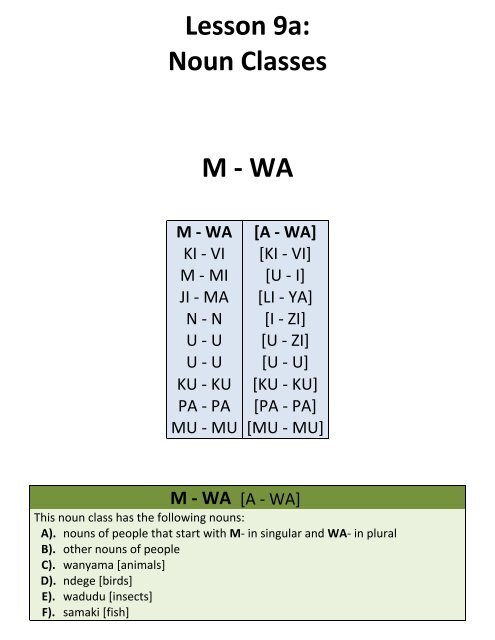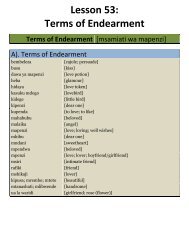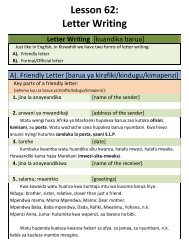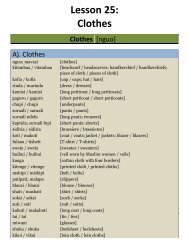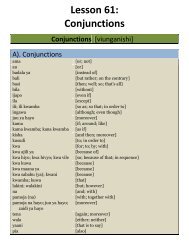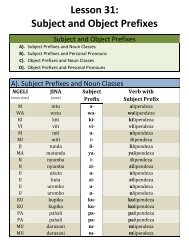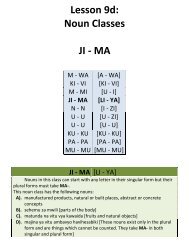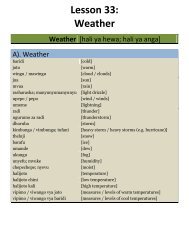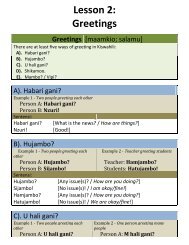Lesson 9a: Noun Classes M - WA - Swahili
Lesson 9a: Noun Classes M - WA - Swahili
Lesson 9a: Noun Classes M - WA - Swahili
Create successful ePaper yourself
Turn your PDF publications into a flip-book with our unique Google optimized e-Paper software.
<strong>Lesson</strong> <strong>9a</strong>:<br />
<strong>Noun</strong> <strong>Classes</strong><br />
M - <strong>WA</strong><br />
M - <strong>WA</strong> [A - <strong>WA</strong>]<br />
KI - VI [KI - VI]<br />
M - MI [U - I]<br />
JI - MA [LI - YA]<br />
N - N [I - ZI]<br />
U - U [U - ZI]<br />
U - U [U - U]<br />
KU - KU [KU - KU]<br />
PA - PA [PA - PA]<br />
MU - MU [MU - MU]<br />
M - <strong>WA</strong> [A - <strong>WA</strong>]<br />
This noun class has the following nouns:<br />
A). nouns of people that start with M- in singular and <strong>WA</strong>- in plural<br />
B). other nouns of people<br />
C). wanyama [animals]<br />
D). ndege [birds]<br />
E). wadudu [insects]<br />
F). samaki [fish]
A). <strong>Noun</strong>s of people that start with M- in singular and<br />
<strong>WA</strong>- in plural<br />
mtoto/watoto [child/children]<br />
mgeni/wageni [visitor/visitors]<br />
mfaransa/wafaransa [French person/French people]<br />
mjomba/wajomba [uncle/uncle]<br />
mke/wake [wife/wives]<br />
mkulima/wakulima [farmer/farmers]<br />
mpishi/wapishi [cook/cooks]<br />
msichana/wasichana [girl/girls]<br />
mtu/watu [person/people]<br />
mume/waume [husband/husbands]<br />
mvulana/wavulana [boy/boys]<br />
mzee/wazee [elder/elders]<br />
mzungu/wazungu [white man/white men]<br />
mjerumani/wajerumani [German person/German people]<br />
mwanamume/wanaume [man/men]<br />
mwanamke/wanawake [woman/women]<br />
mwalimu/walimu [teacher/teachers]<br />
mwanafunzi/wanafunzi [student/students]<br />
mwafrika/waafrika [African person/African people]<br />
B). Other nouns of people<br />
baba/baba [father/fathers]<br />
babu/babu [grandfather/grandfathers]<br />
dada/dada [sister/sisters]<br />
kaka/kaka [brother/brothers]<br />
mama/mama [mother/mothers]<br />
nyanya/nyanya [grandmother/grandmothers]<br />
rafiki/rafiki [friend/friends]<br />
shangazi/shangazi [aunt/aunts]<br />
kipofu/vipofu [blind person/blind people]<br />
kiziwi/viziwi [deaf person/deaf people]
C). Wanyama [animals]<br />
mbwa/mbwa [dog/dogs]<br />
paka/paka [cat/cats]<br />
ng’ombe/ng’ombe [cow/cows]<br />
simba/simba [lion/lions]<br />
ndovu/ndovu [elephant/elephants]<br />
D). Ndege [birds]<br />
kuku/kuku [hen/hens]<br />
kasuku/kasuku [parrot/parrots]<br />
tai/tai [eagle/eagles]<br />
bata mzinga/bata mzinga turkey/turkeys]<br />
E). Wadudu [insects]<br />
nyuki/nyuki [bee/bees]<br />
mbu/mbu [mosquito/mosquitoes]<br />
nzi/nzi [fly/flies]<br />
F). Samaki [fish]<br />
ngege/ngege [tilapia/tilapia]<br />
papa/papa [shark/sharks]<br />
Zingatia [Note]<br />
When using a verb, this noun class uses A- in singular and <strong>WA</strong>- in plural for<br />
sentence formation.<br />
Sentence Formation<br />
Mifano:<br />
1. Mwanafunzi anasoma. [The student is reading.]<br />
Wanafunzi wanasoma. [The students are reading.]<br />
2. Mwalimu anaimba. [The teacher is singing.]<br />
Walimu wanaimba. [The teachers are singing.]<br />
3. Rafiki alikuja nyumbani. [The friend came home.]<br />
Rafiki walikuja nyumbani. [The friends came home.]<br />
4. Mama anapika kuku. [The mother is cooking chicken.]
Mama wanapika kuku. [The mothers are cooking chicken.]


